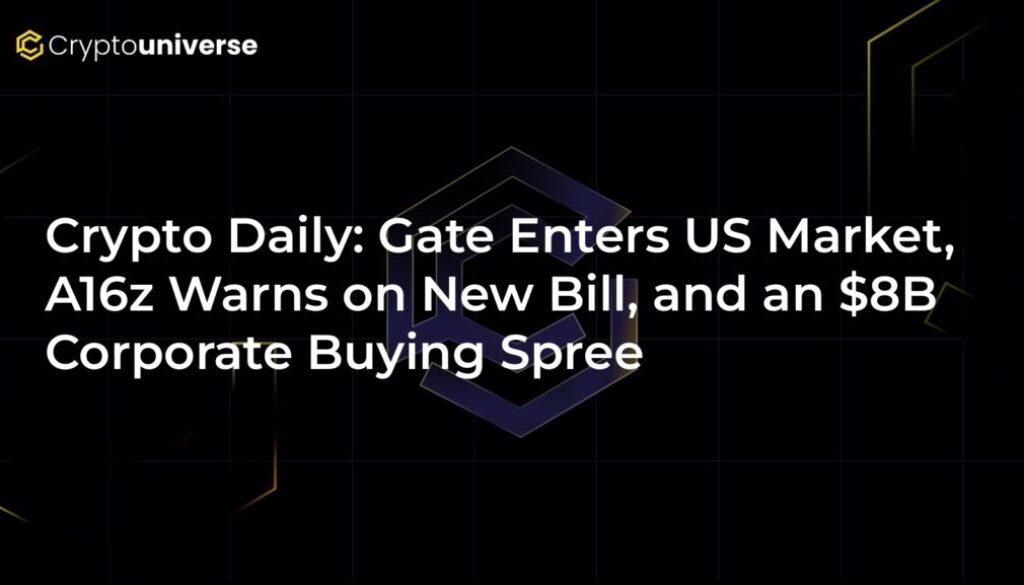Crypto Daily: Gate Enters US Market, A16z Warns on New Bill, and an $8B Corporate Buying Spree

Your Daily Crypto Briefing: Regulation, Expansion, and a Corporate Cash Splash
Need to know what happened in crypto today? The digital asset landscape is buzzing with major developments, from exchange expansions and regulatory debates in the United States to a staggering wave of corporate investment. Today’s top stories show a market in motion, grappling with its future rules while big players place massive bets on its success. Here’s the breakdown of what you need to know about how
Gate Exchange Launches US Spot Trading Amid Regulatory Thaw
In a significant move for American crypto traders, crypto exchange Gate has officially launched spot trading services in the United States. The company, founded in 2013, pointed to improving regulatory clarity in the country as the primary driver for its expansion.
This development opens the door for US customers to access Gate’s extensive offerings. Here’s what we know:
- Massive Asset Variety: As of late July, Gate offered over 3,800 trading pairs, making it one of the most diverse platforms available.
- High Trading Volume: The exchange boasts a 24-hour spot trading volume of $6.8 billion, according to CoinMarketCap data, indicating deep liquidity.
- Future Services: Gate plans to roll out fiat on-ramps and off-ramps, as well as support for custodial wallets, to further enhance its US services.
Gate’s reentry into the US market is part of a broader trend where crypto firms are once again establishing a foothold in the country, signaling growing confidence in the evolving legal framework.
A16z Sounds Alarm on Draft US Crypto Bill, Citing Major Loopholes
While some celebrate regulatory clarity, venture capital giant Andreessen Horowitz (a16z) is urging caution. In a formal open letter to the US Senate Banking Committee, the firm warned that a new draft crypto bill could introduce dangerous loopholes and weaken investor protections.
The letter addresses a discussion draft that builds on the 21st Century Financial Innovation and Technology Act (CLARITY Act). A16z’s primary concern revolves around the proposed definition of “ancillary assets.” This term refers to tokens sold as part of an investment contract that do not grant the buyer any equity, dividends, or governance rights.
“The ancillary asset construct should not serve as the foundation for legislation without significant modifications,” the letter stated emphatically. A16z argues that this approach fails to address core market issues and, critically, would be incompatible with the Howey test—the long-standing legal precedent used to determine what constitutes a security. This intervention from a major industry stakeholder highlights the high-stakes debate shaping the future of crypto regulation in the US.
Corporate Treasuries Unleash $8 Billion Crypto Buying Frenzy
Shifting from regulation to accumulation, crypto treasury firms have made headlines this week by committing to spend a colossal $7.8 billion on digital assets. This buying blitz signals immense institutional and corporate confidence, with altcoins emerging as a surprisingly popular choice.
An analysis of 16 company statements reveals a clear trend of aggressive accumulation:
- Ether Leads the Altcoin Pack: At least five companies have either purchased or announced plans to buy over $3 billion worth of Ether (ETH), making it the week’s hottest target.
- Major Altcoin Moves: Tron Inc., associated with Justin Sun, announced plans to raise $1 billion to purchase its native token, TRX. Meanwhile, YZi Labs, linked to Binance co-founder Changpeng Zhao, facilitated a $500 million deal for a BNB-buying firm.
- Bitcoin Remains King: Despite the altcoin buzz, Bitcoin (BTC) saw the largest total buys. Strategy (a likely reference to MicroStrategy) led the charge, acquiring approximately $2.5 billion in BTC financed by its latest preferred stock offering.
However, this gold rush isn’t without risk. Will Owens, an analyst at Galaxy Research, warned that the sector is becoming “increasingly crowded.” He noted that crypto treasury companies “can become structurally fragile” if hundreds of firms all make the same one-directional trade, creating potential systemic risk.
A Market of Contrasts
Today’s news paints a picture of a dynamic and complex industry. On one hand, improved regulatory sentiment is paving the way for major exchanges like Gate to expand. On the other, influential players like a16z are actively fighting to ensure new laws are robust and effective. And underneath it all, corporate treasuries are voting with their dollars, pouring billions into the ecosystem. This interplay between expansion, regulation, and investment will continue to define the next chapter for crypto.


